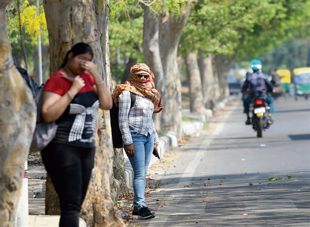
Wuhan Diary: Dispatches from a Quarantined City by Fang Fang. HarperCollins. Pages 380. Rs 833
Roopinder Singh
The epicentre of the Covid-19 pandemic “isn’t the purgatory that a lot of people seem to be imagining it to be. It is instead a rather quiet and beautiful, almost majestic, city. But all that changes the second someone in your family falls ill. Immediately everything is thrown into chaos.” Fang Fang, an award-winning Chinese author who “never joined the Communist Party” should know. She has chronicled day-to-day life in China’s ninth biggest city.

finds resonance all over the world because what
happened there was the precursor to the times we
are living in today. AFP
“Not Contagious Between People; It’s Controllable and Preventable.” Literally famous last words of the team of doctors and officials in the initial days of the outbreak of the virus, a time during which Chinese authorities made more effort to control the narrative rather than take active measures to contain the contagion and tend to the sick. It was during this period that the now infamous January 29 Chinese New Year feast was held by the Baibuting community in Wuhan’s Jiangan district. At a time when there were 62 Covid-19 patients, at Baibuting, 40,000 people cooked and ate together. The numbers exploded soon after.
The unfortunate inclination among local officials to hide bad news was to cost very dear. The Wuhan Municipal Health Commission had admitted human-to-human contact on January 16, two days before the banquet and six days before the city was finally quarantined.

Isn’t there a fundamental problem when everyone knows something is wrong, but no one dares to speak out?
A mountain may separate us, yet we share the same clouds and rain; The bright moon belongs to both my village and yours.
There is only one true test, and that is how you treat the weakest and most vulnerable members of your society.
Are these officials completely lacking in basic common sense, or do they look at citizens as somehow less than human?

Wuhan is a big city, the size of London. The diary starts on January 25, five days after the quarantine. It concluded on March 24, just as the lockdown was lifted. Written in Mandarin, it was posted daily on Weibo, sometimes WeChat. It had its run-ins with the censors, attacks by trolls and was also taken down at times but managed to come back. Fang is a novelist who has lived in Wuhan for 63 years, since she was two, working her way through being a porter, a reporter, an editor and a writer. She won the Lu Xun Literary Prize and the Chinese Literature and Communications Prize for Outstanding Writer.
The questions about the initial inertia of the officials and strident demands for accountability show how she remains an outsider within the system. Yet, what shines through the most is the human dimension of the suffering she chronicles. As an old-timer, she has access and uses it to inform us about the views of doctors and other informed sources, whom she protects.
On February 7, she says, “During this dark, heavy night, Li Wenliang will be our light.” The doctor was one of the eight whistleblowers who were punished by the police for raising the alarm about the new virus. He had succumbed to the virus a day earlier. “The tears people shed for him are like an unstoppable wave inundating the internet. Tonight, Li Wenliang will sail away to another world on a wave of tears.”
The diary brings in the human dimension of the crisis. We are witness to the breakdown of the hospital system, the anguish of the doctors who are treating patients, and their colleagues, the way people help each other out and the avarice of some. Fang is impressed by the industry and caring deeds of the young, and her observation: “People of each generation are actually all the same in some way, and the older generation shouldn’t worry too much about the younger generation’s not finding their way,” is universal.
We admire the volunteers who make their way to Wuhan to help people in distress, empathise with those who fall through the cracks, until their plight is highlighted on social media, and reflect on the parallels we see in our own country. We are stuck with horror at the image of a pile of phones — all that remains of people cremated with undue haste and without the standard rituals. We gain hope from stories of people coming together to help the old and the infirm.
The need for transparency, the importance of keeping people informed, allowing people freedom even when restrictions are imposed, eschewing the urge to control the narrative rather than address the underlying issues, relying on the good sense of people, all at once applicable locally, and universally.
The pandemic has shown how man-made barriers, even natural ones, can so easily be breached by the virus. The entire world has suffered because of it. The diary reminds us of the essential oneness of humankind. What Fang chronicles in the book goes on to show how we humans are more similar than we allow ourselves to realise. What happens in the pages of this diary is just so relatable that it makes us forget the repetitious nature of many of the entries. The loose ends are not all tied, just as in real life.
Fang Fang writes about Wuhan. The diary finds so much resonance all over the world because what happened in Wuhan was the precursor to the world we are living in today.
Join Whatsapp Channel of The Tribune for latest updates.



























